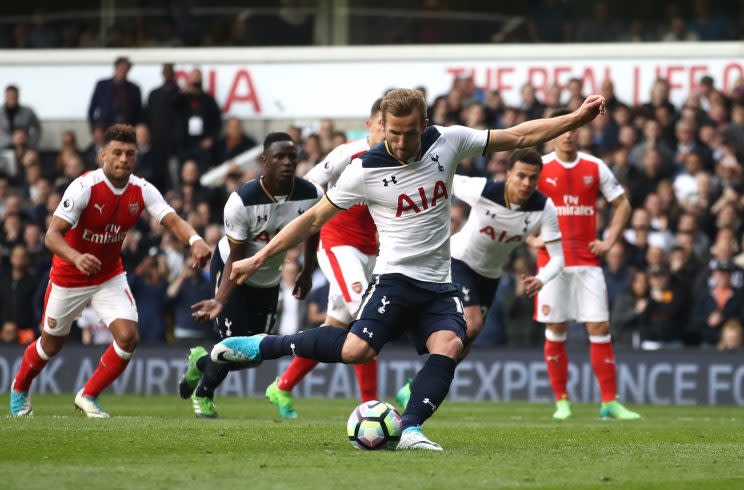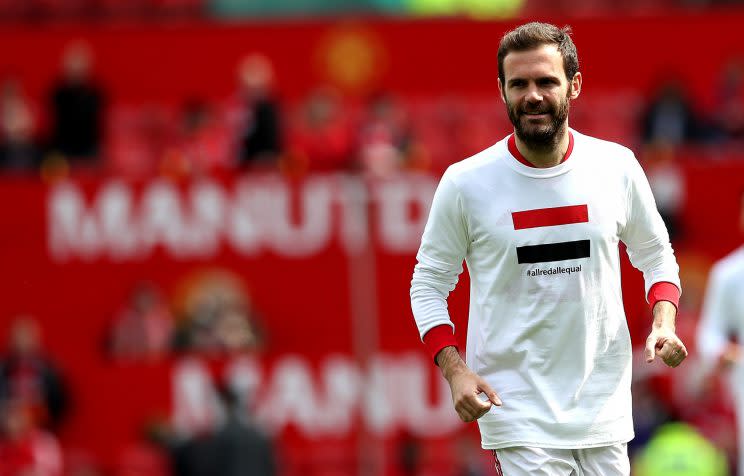Premier League round-up: Tottenham inflict more pain on Arsenal

Spurs keep Arsenal on the ropes
The thing about playing three at the back is that you have one more central defender. That’s obvious, clearly, but another central defender will provide you with additional bodies in the middle of the pitch, and a psychological reassurance. Of course, your wing-backs need to do their job, and the holding midfielders in front of you need to offer protection. But there are more of you, so you defend better.
That’s the theory, and often the practice. It worked for Chelsea, and it has worked for others. But to switch from three, to four, to three, well, you’d have to have the towering intellect of someone like Brendan Rodgers to really make it work.
READ MORE: Rampant Spurs beat Arsenal to ensure victory in last derby at White Hart Lane
READ MORE: Mourinho – Jones and Smalling unlikely to face Celta
It takes time to be sure of your position, and of your relationships with the players next to you. To be strong, to even consider thinking about thinking about perfection, you need hours on the pitch and on the training ground.
Arsenal only recently adopted three at the back. It worked, for a while, and it might work again. But against Spurs it added another layer of problems. Not only is Dele Alli a magnificent player, not only is Harry Kane lethal, but everyone at Spurs knows exactly what to do and they can carry it out at the flick of a switch. Talk of a powershift is premature, but talk of a clear superiority for Spurs is reasonable. They have worked hard to earn it. It isn’t a fluke.
The north London derby, where Spurs had the maturity, talent, manager and teamwork to run out comfortable winners, didn’t prove the superiority for the first time. It was proven for almost the 40th time this season.
Chelsea can consider themselves Champions
If Chelsea don’t win the league from here, then the whole squad and manager will have to resign and then retire in penance. They have almost certainly triumphed this season, and it is well deserved. Their 3-0 win at Everton, with a freshness that none of their rivals have come close to matching, demonstrated just how far ahead they have been this season.
Gary Cahill scored – again – providing the leadership by example that many clubs would have missed had they lost John Terry. Willian might seek first team football elsewhere in the summer, but his performance levels have barely dropped from the bench. Eden Hazard and Diego Costa are revitalised, and Cesc Fabregas is again incisive.
READ MORE: Jesus saves Manchester City as Citizens salvage a point
READ MORE: Pedro gets Chelsea firing as Conte’s men close in on Premier League title
The praise, though, lies mainly with the manager. Jose Mourinho showed how low this collection of players could sink with the wrong leadership, while Conte has let the players rediscover their very best talents and consistency. The gruelling demands of European football, and the inevitability of transfers make Chelsea’s task next season far harder, but they are coming from a resilient, dangerous basis, full of self-confidence and reward.
Negredo highlights City’s flaws
Manchester City, like United and Liverpool, have suffered where Chelsea haven’t. The demands of European football, and much worse squads, have meant that whichever manager has been in charge, they have failed to consistently hit their stride. Pep Guardiola had journalists soiling themselves with pleasure in the early stages of the season. Liverpool looked like credible rivals to Chelsea when they were obliterating oppositions before the turn of the year. Manchester United have occasionally dabbled with form, and have their long unbeaten streak.
But none of those things matter, as United showed at Swansea and City showed at Middlesbrough. 2-2, with a late equaliser, is a heartening way to keep their edge over United in the race for a top four place, but it is still a 2-2 draw at Middlesbrough. It is a mark of their continued defensive problems, and perhaps the problem of the rigours of Champions League football for much of the season. The transfer window can’t come soon enough.
Manchester United’s injury crisis puts both the top four and Europa League at risk

It is, to the outsider, galling to see managers and players claim they are suffering from tiredness. The immediate response is to cite the limited physical activity required in playing a couple of games a week, and the level of remuneration that they’re given for their efforts.
Of course, that misses the point. Players have millions of pounds to earn over a limited shelf-life, so you can hardly blame them for a safety-first approach to their fitness, especially given the aches and limps of the players that preceded them. It also misses that at the top, regardless of your own fitness, if you are competing against teams who have even more rest, they will have a slight edge on you.
United’s players can, then, probably cope with their busy fixture list, but there are two things to remember. One, when an injury crisis hits in defence, you can only use so many players in your squad effectively. Marouane Fellaini can’t play at left-back. And secondly, in a race for the Champions League against Liverpool (out of Europe) and Manchester City (out of Europe), they have a moderate amount more freshness. Over time, that disadvantage will start to make a difference. Injuries to Luke Shaw and Eric Bailly will only be compounded by another Europa League game.
David Moyes pays for other people’s mistakes
When David Moyes arrived at Manchester United, he was almost instantly let down by those around him, and given a duff hand. The squad was in decline, and Ed Woodward could only give him Fellaini after suggesting there was plenty more, and plenty better, that would arrive instead. The players who were already there weren’t impressed, and there was a limited insurrection against the new bloke.
AS IT HAPPENED: Middlesbrough earn fighting draw against City
READ MORE: Rashford ‘deceived the referee’ – Clement
But Moyes played his options poorly. He didn’t kick against the incompetence of Woodward, or use his own contacts to sort out any deals. He didn’t massage the egos of disappointed players who missed Alex Ferguson, and he didn’t abandon his boring, conservative methods that had once worked with Leon Osman.
At Sunderland, he told his players right away that they were relegation material. He intimated that he would not have even taken the job had he known more about the club. He threatened to slap a woman, apparently in jest. So he made his own mistakes, and serious ones. But we know from Everton, Preston and to some extent at Real Sociedad, that he can succeed on a tight budget. Every year that has gone by, Ellis Short has provided diminishing support for a procession of managers, relying on miracles to stay up. Moyes has suffered through his own errors, but to be fair to him, he has suffered far harder because of the shortcomings of others.


